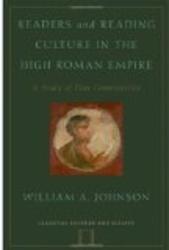Description
This essay examines how elite Roman readers interacted with classical literature and how this interacted with society at large. It uses evidence from papyri to explore how reading communities differed and how they shared similarities with modern readers.
In
Readers and Reading Culture in the High Roman Empire, William Johnson examines the system and culture of reading among the elite in second-century Rome. The investigation proceeds in case-study fashion using the principal surviving witnesses, beginning with the communities of Pliny and Tacitus (with a look at Pliny's teacher, Quintilian) from the time of the emperor Trajan. Johnson then moves on to explore elite reading during the era of the Antonines, including the medical community around Galen, the philological community around Gellius and Fronto (with a look at the curious reading habits of Fronto's pupil Marcus Aurelius), and the intellectual communities lampooned by the satirist Lucian. Along the way, evidence from the papyri is deployed to help to understand better and more concretely both the mechanics of reading, and the social interactions that surrounded the ancient book. The result is a rich cultural history of individual reading communities that differentiate themselves in interesting ways even while in aggregate showing a coherent reading culture with fascinating similarities and contrasts to the reading culture of today.
